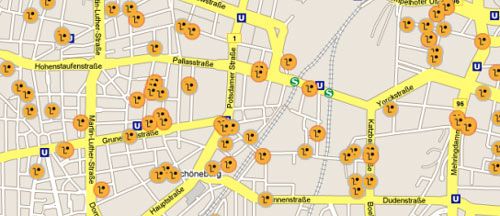A popular proverb states you don't get anything for nothing in this world. This wise statement certainly holds true for the websites below. They are free in that you don't have to pay money to take advantage of the service they offer. However, what they will cost you is some time and dedication.
(1) Couch Surfing / Hospitality Club - These two are completely independent communities, however the idea behind both projects is very similar, thus they share spot #1. Check out video below for a quick intro.
Couch Surfing
Sign up for Couch Surfing if you would like to meet and interact with people around the world. The motivation of this community is to share whatever you have with others - your expertise, a bit of company, dinner, a cup of tea or your couch or guest bed. As a member you can set up a profile in which you write about yourself and describe what you have to offer. People interested in meeting you or surfing your couch can contact you through your profile. Within the community you can join groups for special interests, for example to hear about meetings or get togethers in your area. Once you met someone through the site you can leave a reference on their profile and become their friend. I have been a member of Couch Surfing for almost two years, hosted several dozen people, gave them a tour through my city, had meals and went out with them. I was hosted by two people and I can tell you, it's such an incredible feeling to be welcome and treated like family by a stranger far away from home. The only negative experiences I made were with people who didn't show up or canceled last minute. Other than that everyone was at least nice, but most people I met were awesome.
Hospitality Club
Now that you know about Couch Surfing, there is not much left to say about Hospitality Club. It's the same, but different. Many avid Couch Surfers are also members of Hospitality Club and vice versa. I like to keep it simple and decided for the site that looked cooler and seemed more easy to use. For example Hospitality Club urges guests to share their personal information including passport number with their hosts and encourages hosts to check the passport of arriving guests. While this is a good precaution, it somehow turned me off. I'm not a control freak, I like to be a bit naive and trust in common sense and humanity. Couch Surfing just seemed more like I would fit in there.
(2) FreeCycle
The Freecycle Networkâ„¢ is a nonprofit movement, dedicated to the free exchange of anything people want to part with. Furniture, electronic devices, toys, clothes, anything. It's subdivided into individual local groups, located across the globe. These groups are basically Yahoo Groups that are utilizing the eMail list feature. You may post OFFERED as well as WANTED items to the public list and anyone who is interested or can help out will contact you directly. The groups are moderated by local volunteers. To sign up search for your community or browse all existing groups. If you find that there is no group in your area, you can start one and add it to the Freecycle Networkâ„¢. Currently the network consists of 4,233 groups with a total of 4,444,000 members.
(3) FON
FON is the world's largest WiFi community. FON members, also known as Foneros, share their WiFi connection with others for free. In return, when they leave their home base, they can use the WiFi connection provided by other Foneros for free. If you do not wish to share your WiFi for free, you could even make a little money. However, this would exclude you from using FON Spots for free.
With FON Maps you can check whether or not a FON Spot is available in your area. The image below shows a random selection from a residential area in Germany's capital Berlin. Every yellow face represents one available access point.

(4) GeoCaching
GeoCaching is the modern form of treasure hunting using the internet, geographical data and a GPS device (although you could manage to do it without the gadget). You can hide a treasure (cache) yourself, then log onto the site and share the location. Or you can look for caches hidden in your area and begin searching for them.
(5) BookCrossing
BookCrossing has been around for a long time. It's an adventure for people who love to read and share. Share your favorite book with a lucky stranger. Sign up with BookCrossing, receive an ID and printout explaining what BookCrossing is, paste it in your book and then set it free - anywhere. You can leave the book on a bench in a park or lay it on someone's care in the parking lot or drop it in a mailbox. If you're lucky the recipient will log into the BookCrossing website, report the book with the ID they found inside and leave a comment about how they liked it.
(6) PostCrossing
PostCrossing may sound like BookCrossing, but the two have little more than a similar name in common. PostCrossing is about receiving postcards from around the world. Signing up requires sharing your postal address. The next step is to request an address and mail this person a postcard. To verify that your postcard was sent and received, the recipient will submit the ID you noted onto your card to the site. Next you're in the queue to receiving a postcard from a random stranger somewhere on this planet. I've tried it, it really works!
Isn't it amazing what possibilities the internet has opened up and how we can connect through it? What are your thoughts on these communities and which pages did I miss? Please share!






